Mark David Gerson's Blog, page 16
January 1, 2012
Mark David Gerson: A Writer's Life I
 This is an updated version of an interview that originally appeared on Jean Vallesteros's Book Nerd blog. Read the original and related material here.
This is an updated version of an interview that originally appeared on Jean Vallesteros's Book Nerd blog. Read the original and related material here. Book Nerd: What inspired you to pen your first novel? Where did you get your ideas for The MoonQuest?
Mark David Gerson: I have written a blog post, "The Birth of a Book," that covers that story. In short, though, I had no plans to write a MoonQuest, nor did I have a conscious desire to write a fantasy novel, let alone a trilogy. The MoonQuest birthed itself during a Toronto writing workshop I was facilitating when, in an unprecedented in-the-moment inspiration, I did the same exercise I had presented to participants. What I wrote that evening became the opening scene of the first draft of a novel I knew nothing about. From there, I just kept writing, discovering the story as I went along, until I was done. The StarQuest and SunQuest stories emerged similarly.
BN: What tools do you feel are must-haves for writers?
 MDG: An open heart and mind and a willingness to surrender to your story and travel wherever it takes you (and to break all the rules getting there).
MDG: An open heart and mind and a willingness to surrender to your story and travel wherever it takes you (and to break all the rules getting there).BN: How long have you been writing?
MDG: Perhaps the better question would be, "How long did I resist writing?" I often joke that my Muse tricked me into writing, given that for most of my early life, I resisted anything remotely creative. My first jobs out of university were in public relations, where I had to write, even if what I wrote at first was largely formulaic. However, that experience gave me the confidence to try my hand at freelance work and, before I knew it, I was a full-time (self-taught) freelance writer and editor, doing mostly magazine, newspaper, corporate and government work. However, it wasn't until my early 30s, when the double-whammy of a creative and spiritual awakening knocked me over the head that I began to explore more creative avenues. And it wasn't until I was 39 that The MoonQuest, my first foray into serious creative writing, began to have its way with me. I've been hooked ever since.
BN: What is The MoonQuest about?
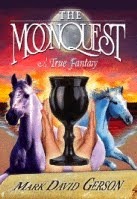 MDG: Imagine a land where storytelling is banned, where storytellers have been put to death, where dreams and visions are outlawed, where imagination has been stripped from the land and its people. This is the Q'ntana of The MoonQuest, a land where, as Toshar, the main character, puts it, "'once upon a time' is a forbidden phrase and fact is the only legal tender." In this land, legend has it, the moon has been so saddened by the silence and tyranny that she has cried tears that have extinguished her light. As a result, the moon has not been seen for many generations. The MoonQuest, then, is the journey undertaken by a reluctant Toshar and his three companions to restore story and vision to the land and to rekindle the light of the moon. Check out the book trailer on YouTube.
MDG: Imagine a land where storytelling is banned, where storytellers have been put to death, where dreams and visions are outlawed, where imagination has been stripped from the land and its people. This is the Q'ntana of The MoonQuest, a land where, as Toshar, the main character, puts it, "'once upon a time' is a forbidden phrase and fact is the only legal tender." In this land, legend has it, the moon has been so saddened by the silence and tyranny that she has cried tears that have extinguished her light. As a result, the moon has not been seen for many generations. The MoonQuest, then, is the journey undertaken by a reluctant Toshar and his three companions to restore story and vision to the land and to rekindle the light of the moon. Check out the book trailer on YouTube.BN: Is there anything you find particularly challenging in your writing? Did you learn anything from writing The MoonQuest and what was it?
MDG: When I begin a project, I rarely know the story in advance. When I began The MoonQuest, for example, I knew nothing about it, except what emerged in each day's writing. I didn't have a title until about halfway through and I had no idea of the ending until about two-thirds of the way through. It was an experience in surrender: in surrendering unconditional control to my Muse and to the story. And it was tough! It was tough to keep writing with no plot, no outline and not even the remotest clue where the story was taking me. But it taught me how to get out of the way and let the story have its way with me. That's still how I write — regardless of the form, genre or project. I now do it with much less resistance than I did it on The MoonQuest. But it's still, sometimes, the most challenging aspect of the work...even as it's also the most exhilarating and is, for me, the key to the magic!
BN: If you had to choose, which writer would you consider a mentor?
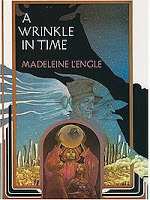 MDG: I'd probably have to say Madeleine L'Engle, author of A Wrinkle in Time. I didn't discover A Wrinkle in Time
MDG: I'd probably have to say Madeleine L'Engle, author of A Wrinkle in Time. I didn't discover A Wrinkle in Time and its sequels until I was an adult, when I also discovered, through her nonfiction writings, L'Engle's deep spirituality, one that informed her creativity and her life. While L'Engle's spirituality found its expression through the Episcopal Church and mine is largely unstructured, she was a profound influence on my writing and my life. In a sense, she already was a mentor without me knowing it. Now, if she were still alive, I'd like to thank her for that.
and its sequels until I was an adult, when I also discovered, through her nonfiction writings, L'Engle's deep spirituality, one that informed her creativity and her life. While L'Engle's spirituality found its expression through the Episcopal Church and mine is largely unstructured, she was a profound influence on my writing and my life. In a sense, she already was a mentor without me knowing it. Now, if she were still alive, I'd like to thank her for that.BN: What is your work schedule like when you're writing?
MDG: For the most part, I don't believe in fixed routines. Rather, I operate intuitively — in my writing and in my life. I'm not one of those people who writes at the same time every day or who believes that you should sit down to write regardless of how you feel. While other coaches and instructors recommend applying a regular routine to creative production, that method never works for me for very long. Rather, I remain as in-the-moment as I can and follow wherever the inspiration leads me — in my life as well as in my writing. That way of living and writing is both exhilarating and, at times, terrifying. But it does keep things in an organic balance!
BN: What was one of the most surprising things you learned in creating The MoonQuest?
MDG: Three things, I suppose. The first was that I was actually creative. The second, that the methods I had been teaching (what I call "writing on the Muse Stream": writing nonstop, without thinking, without worrying about where the story was going) actually worked on something as long as a novel. And the third, related to the second, that the story was, truly, way smarter than I was!
BN: How many books have you written? Which is your favorite?
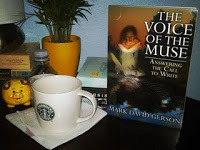 MDG: I have two books out:
The MoonQuest: A True Fantasy
and my book about writing,
The Voice of the Muse: Answering the Call to Write
. And I have three books-in-progress: a memoir and
The StarQuest
and
The SunQuest
, the two sequels to The MoonQuest, which, together, form The Q'ntana Trilogy. (As well, there are the three Q'ntana screenplays, also in various stages of completion). But asking which is my favorite would be like asking a parent to choose a favorite child. Each is meaningful to me in particular ways and each is a favorite for particular reasons!
MDG: I have two books out:
The MoonQuest: A True Fantasy
and my book about writing,
The Voice of the Muse: Answering the Call to Write
. And I have three books-in-progress: a memoir and
The StarQuest
and
The SunQuest
, the two sequels to The MoonQuest, which, together, form The Q'ntana Trilogy. (As well, there are the three Q'ntana screenplays, also in various stages of completion). But asking which is my favorite would be like asking a parent to choose a favorite child. Each is meaningful to me in particular ways and each is a favorite for particular reasons! BN: What were your feelings when you first saw the cover of of your first published book?
MDG: When I opened the FedEx envelope and pulled out my advance copy of The MoonQuest, I burst into tears. I didn't expect to have that same reaction with my second book, The Voice of the Muse....but I did!
BN: If you gave some of your characters an opportunity to speak for themselves, what would they say?
MDG: What took you so long to get our story out??!? Seriously, I spoke to my characters while writing all three books in the fantasy trilogy. It was some of those conversations that led to some of the most surprising (to me) and powerful scenes in the books.
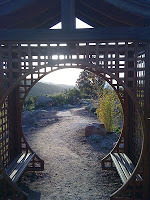 BN: Are there any tips you would give a book club to better navigate their discussion of The MoonQuest?
BN: Are there any tips you would give a book club to better navigate their discussion of The MoonQuest?MDG: I would invite readers not only to look at the book from the outside, as readers, but to look at the journey the main characters undertake in the book through the lens of their own life experience. In other words, where does The MoonQuest speak to you, personally, in your life?
BN: Who is your favorite character in The MoonQuest, and why?
MDG: I'll answer this question as long as you don't reveal my answer to the book's main characters! My two favorite characters, I think, are the two quirkiest...the ones that always make me smile and sometimes make me laugh out loud: the Ferryman (he's so minor that he has no name) and Pryma, a giant, one-eyed turtle-like creature, who makes a return appearance in The SunQuest.
BN: What was your favorite chapter to write and why?
MDG: Given that the first draft of The MoonQuest was one 400-page chapter, that one's impossible to answer! As I mentioned earlier, I had no idea what the story was or where it was taking me, so I just kept writing, with no chapter breaks, until the first draft was done. I only added chapter and section breaks in later drafts. I did include chapter breaks in the first draft of The StarQuest and The SunQuest. Although they felt arbitrary at the time, my intuitive sensings must have been fairly accurate as most of those chapter breaks have changed.
BN: Can you see yourself in any of your characters?
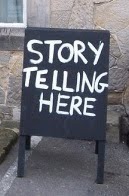 MDG: Authors who claim that they don't see aspects of themselves in all their characters are either lying, blind or woefully un-self-aware. I am in all my characters, even (I hate to admit) the nastiest! In The MoonQuest, though, the character I most identify with is Toshar, the main character whose first-person account the story is. This young man who discovers his stories and his storytelling ability through his MoonQuest journey was very much a metaphor for the creative deepening that writing the book represented for me at that time in my life.
MDG: Authors who claim that they don't see aspects of themselves in all their characters are either lying, blind or woefully un-self-aware. I am in all my characters, even (I hate to admit) the nastiest! In The MoonQuest, though, the character I most identify with is Toshar, the main character whose first-person account the story is. This young man who discovers his stories and his storytelling ability through his MoonQuest journey was very much a metaphor for the creative deepening that writing the book represented for me at that time in my life.BN: Has a review or profile ever changed your perspective on your work?
MDG: I haven't had that experience with a review. But I have had it with reader comments. Two experiences in particular were surprising, and gratifying. In the first, a reader told me why the most difficult scenes in the book supported the story's theme. Those were scenes that had been challenging for me to write, were often challenging for readers to read and, although I intuitively knew they belonged in the book, I couldn't explain why. In the second instance, a reader brought up a theme that I hadn't known was there but that made perfect sense to me once he mentioned it. Truly, my books are smarter than I am!
BN: Tell us your most rewarding experience since being published.
MDG: Although winning awards and getting great reviews for both books have been tremendously gratifying and validating, and although having a film producer primed to turn my books into movies is fabulously exciting, what's most rewarding is when individual readers tell me how one or both of my books has affected them and, in some cases, changed their lives. This moving video, for example, was sent to me by one of my readers.
BN: What are your current projects?
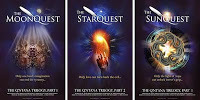 MDG: I recently completed the first draft of Acts of Surrender, a memoir. I'm now in the midst of a fourth draft of The StarQuest book. New drafts of The StarQuest screenplay and The SunQuest book and screenplay will follow once that's done later this month. I'm also an associate producer on The MoonQuest movie project and I am beyond excited to see that move forward.
MDG: I recently completed the first draft of Acts of Surrender, a memoir. I'm now in the midst of a fourth draft of The StarQuest book. New drafts of The StarQuest screenplay and The SunQuest book and screenplay will follow once that's done later this month. I'm also an associate producer on The MoonQuest movie project and I am beyond excited to see that move forward.BN: If you couldn't be an author, what would your ideal career be?
MDG: My secret ambition would be to be a singer! More realistically, I'm also an artist and photographer and would be quite happy devoting more time to those creative pursuits. You can see my art on my website and a lot of my photography on my Facebook page.
BN: Do you have any advice for aspiring authors?
MDG: This is for all writers, not just aspiring ones! Trust the story, even if you don't yet know what it is. Trust your innate creativity. Take it word by word and allow your pen or the keyboard to spell out the story for you. Allow yourself to be the passenger on your creative journey, not the driver. And, of course, get a copy of The MoonQuest and The Voice of the Muse book and CD! Seriously, if you can begin to believe that your story always knows best, you'll never go wrong.
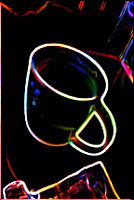 BN: Where is your favorite place to read/write?
BN: Where is your favorite place to read/write?MDG: I'm a bit of a café freak. I love reading and writing at Starbucks (as my Facebook friends/followers have discovered)!
BN: One of your favorite quotes?
MDG: From The MoonQuest: "You either trust or you do not. There is no halfway in between."
BN: Where can your readers stalk you?
MDG: I'm easily stalkable in all the usual places! lolThe best place to contact me is either via my website or Facebook, or by leaving comments on my blog. I'm also on Google+ . FYI: I do my best to respond to all comments and queries...but sometimes it's just not possible. But I read and appreciate them all.
Please "like" these Facebook pages...
• The Voice of the Muse book
• The MoonQuest movie
• The MoonQuest book
• Mark David Gerson
Published on January 01, 2012 09:29
An Author's Life
 This is an updated version of an interview that originally appeared on Jean Vallesteros's Book Nerd blog. Read the original and related material here.
This is an updated version of an interview that originally appeared on Jean Vallesteros's Book Nerd blog. Read the original and related material here. Book Nerd: What inspired you to pen your first novel? Where did you get your ideas for The MoonQuest?
Mark David Gerson: I have written a blog post, "The Birth of a Book," that covers that story. In short, though, I had no plans to write a MoonQuest, nor did I have a conscious desire to write a fantasy novel, let alone a trilogy. The MoonQuest birthed itself during a Toronto writing workshop I was facilitating when, in an unprecedented in-the-moment inspiration, I did the same exercise I had presented to participants. What I wrote that evening became the opening scene of the first draft of a novel I knew nothing about. From there, I just kept writing, discovering the story as I went along, until I was done. The StarQuest and SunQuest stories emerged similarly.
BN: What tools do you feel are must-haves for writers?
 MDG: An open heart and mind and a willingness to surrender to your story and travel wherever it takes you (and to break all the rules getting there).
MDG: An open heart and mind and a willingness to surrender to your story and travel wherever it takes you (and to break all the rules getting there).BN: How long have you been writing?
MDG: Perhaps the better question would be, "How long did I resist writing?" I often joke that my Muse tricked me into writing, given that for most of my early life, I resisted anything remotely creative. My first jobs out of university were in public relations, where I had to write, even if what I wrote at first was largely formulaic. However, that experience gave me the confidence to try my hand at freelance work and, before I knew it, I was a full-time (self-taught) freelance writer and editor, doing mostly magazine, newspaper, corporate and government work. However, it wasn't until my early 30s, when the double-whammy of a creative and spiritual awakening knocked me over the head that I began to explore more creative avenues. And it wasn't until I was 39 that The MoonQuest, my first foray into serious creative writing, began to have its way with me. I've been hooked ever since.
BN: What is The MoonQuest about?
 MDG: Imagine a land where storytelling is banned, where storytellers have been put to death, where dreams and visions are outlawed, where imagination has been stripped from the land and its people. This is the Q'ntana of The MoonQuest, a land where, as Toshar, the main character, puts it, "'once upon a time' is a forbidden phrase and fact is the only legal tender." In this land, legend has it, the moon has been so saddened by the silence and tyranny that she has cried tears that have extinguished her light. As a result, the moon has not been seen for many generations. The MoonQuest, then, is the journey undertaken by a reluctant Toshar and his three companions to restore story and vision to the land and to rekindle the light of the moon. Check out the book trailer on YouTube.
MDG: Imagine a land where storytelling is banned, where storytellers have been put to death, where dreams and visions are outlawed, where imagination has been stripped from the land and its people. This is the Q'ntana of The MoonQuest, a land where, as Toshar, the main character, puts it, "'once upon a time' is a forbidden phrase and fact is the only legal tender." In this land, legend has it, the moon has been so saddened by the silence and tyranny that she has cried tears that have extinguished her light. As a result, the moon has not been seen for many generations. The MoonQuest, then, is the journey undertaken by a reluctant Toshar and his three companions to restore story and vision to the land and to rekindle the light of the moon. Check out the book trailer on YouTube.BN: Is there anything you find particularly challenging in your writing? Did you learn anything from writing The MoonQuest and what was it?
MDG: When I begin a project, I rarely know the story in advance. When I began The MoonQuest, for example, I knew nothing about it, except what emerged in each day's writing. I didn't have a title until about halfway through and I had no idea of the ending until about two-thirds of the way through. It was an experience in surrender: in surrendering unconditional control to my Muse and to the story. And it was tough! It was tough to keep writing with no plot, no outline and not even the remotest clue where the story was taking me. But it taught me how to get out of the way and let the story have its way with me. That's still how I write — regardless of the form, genre or project. I now do it with much less resistance than I did it on The MoonQuest. But it's still, sometimes, the most challenging aspect of the work...even as it's also the most exhilarating and is, for me, the key to the magic!
BN: If you had to choose, which writer would you consider a mentor?
 MDG: I'd probably have to say Madeleine L'Engle, author of A Wrinkle in Time. I didn't discover A Wrinkle in Time
MDG: I'd probably have to say Madeleine L'Engle, author of A Wrinkle in Time. I didn't discover A Wrinkle in Time and its sequels until I was an adult, when I also discovered, through her nonfiction writings, L'Engle's deep spirituality, one that informed her creativity and her life. While L'Engle's spirituality found its expression through the Episcopal Church and mine is largely unstructured, she was a profound influence on my writing and my life. In a sense, she already was a mentor without me knowing it. Now, if she were still alive, I'd like to thank her for that.
and its sequels until I was an adult, when I also discovered, through her nonfiction writings, L'Engle's deep spirituality, one that informed her creativity and her life. While L'Engle's spirituality found its expression through the Episcopal Church and mine is largely unstructured, she was a profound influence on my writing and my life. In a sense, she already was a mentor without me knowing it. Now, if she were still alive, I'd like to thank her for that.BN: What is your work schedule like when you're writing?
MDG: For the most part, I don't believe in fixed routines. Rather, I operate intuitively — in my writing and in my life. I'm not one of those people who writes at the same time every day or who believes that you should sit down to write regardless of how you feel. While other coaches and instructors recommend applying a regular routine to creative production, that method never works for me for very long. Rather, I remain as in-the-moment as I can and follow wherever the inspiration leads me — in my life as well as in my writing. That way of living and writing is both exhilarating and, at times, terrifying. But it does keep things in an organic balance!
BN: What was one of the most surprising things you learned in creating The MoonQuest?
MDG: Three things, I suppose. The first was that I was actually creative. The second, that the methods I had been teaching (what I call "writing on the Muse Stream": writing nonstop, without thinking, without worrying about where the story was going) actually worked on something as long as a novel. And the third, related to the second, that the story was, truly, way smarter than I was!
BN: How many books have you written? Which is your favorite?
 MDG: I have two books out:
The MoonQuest: A True Fantasy
and my book about writing,
The Voice of the Muse: Answering the Call to Write
. And I have three books-in-progress: a memoir and
The StarQuest
and
The SunQuest
, the two sequels to The MoonQuest, which, together, form The Q'ntana Trilogy. (As well, there are the three Q'ntana screenplays, also in various stages of completion). But asking which is my favorite would be like asking a parent to choose a favorite child. Each is meaningful to me in particular ways and each is a favorite for particular reasons!
MDG: I have two books out:
The MoonQuest: A True Fantasy
and my book about writing,
The Voice of the Muse: Answering the Call to Write
. And I have three books-in-progress: a memoir and
The StarQuest
and
The SunQuest
, the two sequels to The MoonQuest, which, together, form The Q'ntana Trilogy. (As well, there are the three Q'ntana screenplays, also in various stages of completion). But asking which is my favorite would be like asking a parent to choose a favorite child. Each is meaningful to me in particular ways and each is a favorite for particular reasons! BN: What were your feelings when you first saw the cover of of your first published book?
MDG: When I opened the FedEx envelope and pulled out my advance copy of The MoonQuest, I burst into tears. I didn't expect to have that same reaction with my second book, The Voice of the Muse....but I did!
BN: If you gave some of your characters an opportunity to speak for themselves, what would they say?
MDG: What took you so long to get our story out??!? Seriously, I spoke to my characters while writing all three books in the fantasy trilogy. It was some of those conversations that led to some of the most surprising (to me) and powerful scenes in the books.
 BN: Are there any tips you would give a book club to better navigate their discussion of The MoonQuest?
BN: Are there any tips you would give a book club to better navigate their discussion of The MoonQuest?MDG: I would invite readers not only to look at the book from the outside, as readers, but to look at the journey the main characters undertake in the book through the lens of their own life experience. In other words, where does The MoonQuest speak to you, personally, in your life?
BN: Who is your favorite character in The MoonQuest, and why?
MDG: I'll answer this question as long as you don't reveal my answer to the book's main characters! My two favorite characters, I think, are the two quirkiest...the ones that always make me smile and sometimes make me laugh out loud: the Ferryman (he's so minor that he has no name) and Pryma, a giant, one-eyed turtle-like creature, who makes a return appearance in The SunQuest.
BN: What was your favorite chapter to write and why?
MDG: Given that the first draft of The MoonQuest was one 400-page chapter, that one's impossible to answer! As I mentioned earlier, I had no idea what the story was or where it was taking me, so I just kept writing, with no chapter breaks, until the first draft was done. I only added chapter and section breaks in later drafts. I did include chapter breaks in the first draft of The StarQuest and The SunQuest. Although they felt arbitrary at the time, my intuitive sensings must have been fairly accurate as most of those chapter breaks have changed.
BN: Can you see yourself in any of your characters?
 MDG: Authors who claim that they don't see aspects of themselves in all their characters are either lying, blind or woefully un-self-aware. I am in all my characters, even (I hate to admit) the nastiest! In The MoonQuest, though, the character I most identify with is Toshar, the main character whose first-person account the story is. This young man who discovers his stories and his storytelling ability through his MoonQuest journey was very much a metaphor for the creative deepening that writing the book represented for me at that time in my life.
MDG: Authors who claim that they don't see aspects of themselves in all their characters are either lying, blind or woefully un-self-aware. I am in all my characters, even (I hate to admit) the nastiest! In The MoonQuest, though, the character I most identify with is Toshar, the main character whose first-person account the story is. This young man who discovers his stories and his storytelling ability through his MoonQuest journey was very much a metaphor for the creative deepening that writing the book represented for me at that time in my life.BN: Has a review or profile ever changed your perspective on your work?
MDG: I haven't had that experience with a review. But I have had it with reader comments. Two experiences in particular were surprising, and gratifying. In the first, a reader told me why the most difficult scenes in the book supported the story's theme. Those were scenes that had been challenging for me to write, were often challenging for readers to read and, although I intuitively knew they belonged in the book, I couldn't explain why. In the second instance, a reader brought up a theme that I hadn't known was there but that made perfect sense to me once he mentioned it. Truly, my books are smarter than I am!
BN: Tell us your most rewarding experience since being published.
MDG: Although winning awards and getting great reviews for both books have been tremendously gratifying and validating, and although having a film producer primed to turn my books into movies is fabulously exciting, what's most rewarding is when individual readers tell me how one or both of my books has affected them and, in some cases, changed their lives. This moving video, for example, was sent to me by one of my readers.
BN: What are your current projects?
 MDG: I recently completed the first draft of Acts of Surrender, a memoir. I'm now in the midst of a fourth draft of The StarQuest book. New drafts of The StarQuest screenplay and The SunQuest book and screenplay will follow once that's done later this month. I'm also an associate producer on The MoonQuest movie project and I am beyond excited to see that move forward.
MDG: I recently completed the first draft of Acts of Surrender, a memoir. I'm now in the midst of a fourth draft of The StarQuest book. New drafts of The StarQuest screenplay and The SunQuest book and screenplay will follow once that's done later this month. I'm also an associate producer on The MoonQuest movie project and I am beyond excited to see that move forward.BN: If you couldn't be an author, what would your ideal career be?
MDG: My secret ambition would be to be a singer! More realistically, I'm also an artist and photographer and would be quite happy devoting more time to those creative pursuits. You can see my art on my website and a lot of my photography on my Facebook page.
BN: Do you have any advice for aspiring authors?
MDG: This is for all writers, not just aspiring ones! Trust the story, even if you don't yet know what it is. Trust your innate creativity. Take it word by word and allow your pen or the keyboard to spell out the story for you. Allow yourself to be the passenger on your creative journey, not the driver. And, of course, get a copy of The MoonQuest and The Voice of the Muse book and CD! Seriously, if you can begin to believe that your story always knows best, you'll never go wrong.
 BN: Where is your favorite place to read/write?
BN: Where is your favorite place to read/write?MDG: I'm a bit of a café freak. I love reading and writing at Starbucks (as my Facebook friends/followers have discovered)!
BN: One of your favorite quotes?
MDG: From The MoonQuest: "You either trust or you do not. There is no halfway in between."
BN: Where can your readers stalk you?
MDG: I'm easily stalkable in all the usual places! lolThe best place to contact me is either via my website or Facebook, or by leaving comments on my blog. I'm also on Google+ . FYI: I do my best to respond to all comments and queries...but sometimes it's just not possible. But I read and appreciate them all.
Please "like" these Facebook pages...
• The Voice of the Muse book
• The MoonQuest movie
• The MoonQuest book
• Mark David Gerson
Published on January 01, 2012 09:29
December 17, 2011
Why Are Americans Afraid of Dragons?
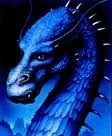 This piece originally appeared in December 2008 on my now-dormant New Earth Chronicles blog.
This piece originally appeared in December 2008 on my now-dormant New Earth Chronicles blog.Wednesday, December 19, 2008
I'm in the video section of Target, Christmas shopping for my daughter. As I'm browsing through the movie racks, I overhear an older and younger woman discussing which DVD to buy a child on their list.
"What about Eragon
 ?" the younger woman asks. "I hear it's good."
?" the younger woman asks. "I hear it's good.""Does it have magic in it? I don't want a movie with magic," the older one -- her mother? -- responds sternly.
They move out of earshot and I'm too stunned to follow.
Are we truly living in some version of The MoonQuest's mythical setting? This land where vision is outlawed and visionaries put to death, where myth and magic are forbidden, where "once upon a time" is a forbidden phrase, and where fact is the only legal tender was a creation of my imagination... Or was it?
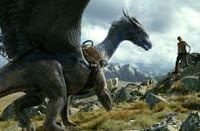 What kind of culture have we created where children are denied magic, where fantasy is suspect and where dragons are relegated to dustbins?
What kind of culture have we created where children are denied magic, where fantasy is suspect and where dragons are relegated to dustbins?Thirty years ago in an essay, author Ursula K. Le Guin asked, "Why are Americans afraid of dragons?" She concluded that most technological cultures dismiss works of the imagination because they lack measurable utility, an outlook only exacerbated in this country by our Puritan heritage.
If 30 years ago dragons were not fit for adults, are they now unfit for children, too?
While the Harry Potter books and movies broadened the reach of imaginative fiction for kids (and adults), it also expanded our hysterical suspicion and suppression of it.
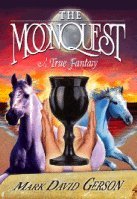 The fact is, imaginative fiction opens our hearts, expands our spirit and broadens our minds in ways that nonfiction never can, and that magical/fantastical fiction can carry more truth in its castles, dragons and trolls than many pieces of so-called literature.
The fact is, imaginative fiction opens our hearts, expands our spirit and broadens our minds in ways that nonfiction never can, and that magical/fantastical fiction can carry more truth in its castles, dragons and trolls than many pieces of so-called literature.That's why I call The MoonQuest a "true fantasy." There is nothing factual about it. But as those two women in Target have proven, it's decidedly true.
Please "like" these Facebook pages...
• The Voice of the Muse book
• The MoonQuest movie
• The MoonQuest book
• Mark David Gerson
Published on December 17, 2011 17:55
December 13, 2011
Use Me
I came across this piece earlier this evening as I was pulling together some material for Acts of Surrender, my memoir-in-progress. Originally posted to my now-dormant New Earth Chronicles blog in July 2007, this piece remains as relevant today as it did back then -- for me and, I trust, for you.
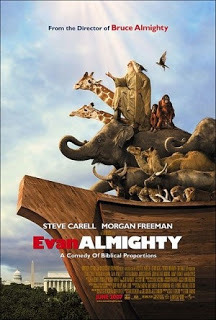 Sunday, July 8, 2007 ~ Sedona, Arizona
Sunday, July 8, 2007 ~ Sedona, Arizona
As I watch the new movie Evan Almighty with my daughter this afternoon, tears mingle with laughter at the story of the ambitious newscaster-turned-Congressman whose life is turned upside-down when God tells him to prepare for an impending flood by building an ark.
with my daughter this afternoon, tears mingle with laughter at the story of the ambitious newscaster-turned-Congressman whose life is turned upside-down when God tells him to prepare for an impending flood by building an ark.
My tears come in Evan's surrender to the higher power that always knows best, the higher power that I, like Evan, have been known to resist, curse and fight.
I have never been asked to build an ark, but I have been guided along roads that seem equally bizarre and incomprehensible, in directions that others have judged or mocked.
Ultimately, though, as with Evan and his flood, the higher guidance has always proven itself wiser and more knowing than a limited human mind that is always trying to figure things out and cling to control.
As the film credits roll, I'm reminded of the song Use Me, Rickie Byars Beckwith 's ardent anthem to ultimate surrender:
's ardent anthem to ultimate surrender:
Use me
Oh, God
I stand for you
And here I'll abide
As you show me
All that I must do
I'm reminded, too, of author Madeleine L'Engle 's description of the Old Testament as filled with bearded prophets shouting up to the heavens, "You want me to do what!?"
's description of the Old Testament as filled with bearded prophets shouting up to the heavens, "You want me to do what!?"
Evan is just such a prophet, as am I. As is each of you. For in every moment, the God Power we carry within is calling on us to do and be the impossible, to build our own version of Evan's ark, even though it makes no conventional sense, even though we don't know where to begin or who we'll be when we're done.
I wrote about the song Use Me in a November 2006 newsletter (The Choice for God), after having cried while singing it during a Sunday service at L.A.'s Agape International Spiritual Center.
Ironically, I had just recommitted to my then-unpublished novel, The MoonQuest , not realizing that this act of recommitment would result in its speedy publication -- by me! (You want me to do what!?)
My tears then as now are the tears of truth. I know that whether I stand in the vibration of that powerful lyric, in the resonance of today's movie or at one of life's many crossroads, my only choice is the highest choice, the choice that prophets through the ages -- all the way up to Evan -- have made: the choice for God.
My God is neither actor Morgan Freeman nor some force outside myself. My God is the divine within me, the highest imperative, infinite wisdom and creative intelligence that asks of me only that I surrender and allow it to use me -- to be me -- as it guides me forward.

As I prepare to leave Sedona tomorrow for parts (yet again) unknown, I recommit to that path of surrender and know that, in so doing, I walk in the path of God. And I am never alone.
And as I continue, in December 2011, to work on the Acts of Surrender memoir I have resisted so mightily, I recognize it as the latest in a long series of arks I have been asked to construct, all of which have proven their ultimate value, despite my initial doubt.
Please "like" these Facebook pages...
• The Voice of the Muse book
• The MoonQuest movie
• The MoonQuest book
• Mark David Gerson
 Sunday, July 8, 2007 ~ Sedona, Arizona
Sunday, July 8, 2007 ~ Sedona, ArizonaAs I watch the new movie Evan Almighty
 with my daughter this afternoon, tears mingle with laughter at the story of the ambitious newscaster-turned-Congressman whose life is turned upside-down when God tells him to prepare for an impending flood by building an ark.
with my daughter this afternoon, tears mingle with laughter at the story of the ambitious newscaster-turned-Congressman whose life is turned upside-down when God tells him to prepare for an impending flood by building an ark.My tears come in Evan's surrender to the higher power that always knows best, the higher power that I, like Evan, have been known to resist, curse and fight.
I have never been asked to build an ark, but I have been guided along roads that seem equally bizarre and incomprehensible, in directions that others have judged or mocked.
Ultimately, though, as with Evan and his flood, the higher guidance has always proven itself wiser and more knowing than a limited human mind that is always trying to figure things out and cling to control.
As the film credits roll, I'm reminded of the song Use Me, Rickie Byars Beckwith
 's ardent anthem to ultimate surrender:
's ardent anthem to ultimate surrender:Use me
Oh, God
I stand for you
And here I'll abide
As you show me
All that I must do
I'm reminded, too, of author Madeleine L'Engle
 's description of the Old Testament as filled with bearded prophets shouting up to the heavens, "You want me to do what!?"
's description of the Old Testament as filled with bearded prophets shouting up to the heavens, "You want me to do what!?"Evan is just such a prophet, as am I. As is each of you. For in every moment, the God Power we carry within is calling on us to do and be the impossible, to build our own version of Evan's ark, even though it makes no conventional sense, even though we don't know where to begin or who we'll be when we're done.
I wrote about the song Use Me in a November 2006 newsletter (The Choice for God), after having cried while singing it during a Sunday service at L.A.'s Agape International Spiritual Center.
Ironically, I had just recommitted to my then-unpublished novel, The MoonQuest , not realizing that this act of recommitment would result in its speedy publication -- by me! (You want me to do what!?)
My tears then as now are the tears of truth. I know that whether I stand in the vibration of that powerful lyric, in the resonance of today's movie or at one of life's many crossroads, my only choice is the highest choice, the choice that prophets through the ages -- all the way up to Evan -- have made: the choice for God.
My God is neither actor Morgan Freeman nor some force outside myself. My God is the divine within me, the highest imperative, infinite wisdom and creative intelligence that asks of me only that I surrender and allow it to use me -- to be me -- as it guides me forward.

As I prepare to leave Sedona tomorrow for parts (yet again) unknown, I recommit to that path of surrender and know that, in so doing, I walk in the path of God. And I am never alone.
And as I continue, in December 2011, to work on the Acts of Surrender memoir I have resisted so mightily, I recognize it as the latest in a long series of arks I have been asked to construct, all of which have proven their ultimate value, despite my initial doubt.
Please "like" these Facebook pages...
• The Voice of the Muse book
• The MoonQuest movie
• The MoonQuest book
• Mark David Gerson
Published on December 13, 2011 22:11
November 29, 2011
The Life-Affirming Experience of Reading
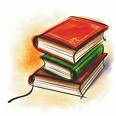 With U.S. Thanksgiving over, the holiday gift-buying season is officially underway, at least in this country. And while the ebook revolution is now irrevocably entrenched (more e-readers were likely sold in the past few days than ever before), people are stilling buying the old-fashioned paper-and-ink versions, especially as holiday gifts.
With U.S. Thanksgiving over, the holiday gift-buying season is officially underway, at least in this country. And while the ebook revolution is now irrevocably entrenched (more e-readers were likely sold in the past few days than ever before), people are stilling buying the old-fashioned paper-and-ink versions, especially as holiday gifts. Three years ago, in the midst of the season's shopping frenzy, Sarah Bagby of Wichita's Watermark Books posted this revelation about the gift of books and the power of reading in the store newsletter.
 "This week I have been reminded time and again of the experience that literature brings to life.
"This week I have been reminded time and again of the experience that literature brings to life."You would think that in this 11th hour of holiday hubbub, shoppers would be frantic to buy whatever books remain on the shelf. But no, the readers who are giving books as gifts are very particular about the gift of language. They are calm and methodical in their quests for the perfect book, patiently listening to my staff about this storyline or that plot twist...
"So in our busiest season, I've realized just how much literature has a calming effect. We read so that we can have the life-affirming experience that reading a book brings. And that's why we give the gift of books."
• Are you still giving books as gifts? To yourself?
• What are you buying? What are you reading?
• Are you still buying hard-copy books? Or have you made the switch to ebooks? As gifts, too?
Please "like" these Facebook pages:• The Voice of the Muse book • The MoonQuest movie • The MoonQuest book • Mark David Gerson
Published on November 29, 2011 10:11
November 16, 2011
The Myth of Writer's Block, or How to Get Writing & Keep Writing
 Perhaps it's the pressure-to-produce of this month's NaNoWriMo. Or maybe it's the looming holiday season (which, in this country, kicks off next week with Thanksgiving). Whatever it is, I'm hearing more and more in recent days about people experiencing writer's block.
Perhaps it's the pressure-to-produce of this month's NaNoWriMo. Or maybe it's the looming holiday season (which, in this country, kicks off next week with Thanksgiving). Whatever it is, I'm hearing more and more in recent days about people experiencing writer's block.
So it seems a good time to reprint this piece, which offers practical tips and guidance for sailing through and past whatever is getting in your way and back into creative flow. (If you'd prefer a video version of this piece, click here.)
Do you have other experiences of writer's block or tips to get the other side of it? Please share them in the comments, below.
You don't have to experience writer's block. Ever.
You don't have to sweat over the blank page. You don't have to chew your pencil (or fingernails) to the nub. You don't have to wonder where the next word is coming from.
Writer's block is a myth -- not because you won't ever feel stuck but because there's no reason for you ever to stay stuck.
Do you wonder where your next breath is coming from? Unless you suffer from some sort of lung disease, you rarely think about your breath. You assume it will come and it does. One breath and then another...and then another.
It comes because you let it, because you don't get in its way, because you're not thinking about it or worrying about it.
Words can be like that, too.
 If you trust in your story, in its inherent wisdom, the words always come. The words always come because they're already there. They're there because, in some sense, your story already exists.
If you trust in your story, in its inherent wisdom, the words always come. The words always come because they're already there. They're there because, in some sense, your story already exists.It exists in the same invisible realm in which your dreams, visions and ideas exist. And if you believe in that existence, if you trust in that existence, if you know deep in your heart that your story is already present and smarter than you are, you will never lack the words your story needs for its expression.
By the way, I use the word "story" in its broadest sense, to encompass all that you would write -- fiction or nonfiction, novel or screenplay, short story or poem. Everything you write, everything you experience, everything you share: It's all story.
So how do you get to that place where the story's words flow as effortlessly as your breath?
By writing. By writing without stopping...without stopping for any reason that could give your critical, judgmental, doubtful, cynical or analytical selves any opportunity for input during these initial, creative stages.
I call this nonstop approach "writing on the Muse Stream" because I believe that when we surrender to our Muse, creativity pours through us as effortlessly as water in a free-flowing stream.
It's natural to want to edit as we go, to want to stop to correct spelling, punctuation or grammar or to grope for the right word.
Don't do it. If you can't think of a word, leave a blank space or write xxx. If you don't like a word you've written, mark it in some way and move on. Don't stop.
"Fine words," I hear you say. "But I'm still stuck."
You may be stuck, but you're not blocked. And you certainly haven't lost your creative ability.
You can't lose something that's an innate part of you, that's an innate part of everyone. Creativity is as natural as breathing and as long as you're breathing, you can write.
Here are seven reasons why you might be feeling stuck and some ways to get unstuck.
1. Fear
Are you discovering things about yourself or your beliefs through your writing that are making you uncomfortable? Is your story carrying you into new, potentially dangerous territory?
Fear will always block us from moving forward in our writing, if we let it. The only solution is to keep writing -- through the fear. Past the fear.
Your fears -- and all your emotions -- can be the most powerful components of your writing. Don't run from them. Write them.
 2. Control
2. ControlWhen we assume that we're in charge of the story, that it has to look or sound a specific way, conform to a particular genre or format, or match a certain outcome or expectation, we're bound to get stuck.
Your story has its own imperative and its own wisdom. You override those at your peril.
Abandon control. Let your story express itself. Let your Muse have its way with you. Let the words spill out of you -- the words your story needs, not the words you think you need.
Write on the Muse Stream, and just keep going. If you find yourself getting stuck, simply repeat your last word or sentence (or any word or sentence). Repeat them over and over and over and over again until you find yourself back in the flow. And you will.
3. Rhythms & Routines
Human beings like routine. We like breakfast at a certain time and a certain kind of pastry with our certain Starbucks coffee drink.
As writers, we often prefer to have set writing times and patterns: writing in a certain room, using a certain pen and sitting down at a certain time.
Rituals and routines, however, can turn into ruts. What worked yesterday may not work today...or ever again.
If you're feeling stuck, you may well be stuck -- in a pattern that's not working anymore.
Try new rhythms and routines. Break existing patterns.
Go for a walk, do yoga stretches, take a shower or do something else unrelated to writing or to your current project. Drive to a scenic spot and write in the car. Write in the morning instead of the afternoon, longhand instead of on the computer, in a café instead of at home.
Find the rhythm and routine that works for you today, and be open to changing it tomorrow.
 4. Perfectionism
4. PerfectionismWhether in writing or in life, many of us are addicted to getting it right. Being perfect means we won't be criticized, judged or rejected. A perfect first draft means fewer revisions.
Being perfect is, well, just a good thing to be. Isn't it?
I've got bad news: Your writing will never be perfect. It may be excellent, accomplished, creative, innovative and insightful. But perfect? Not possible.
It's not possible because there's no perfect way to translate the intangible (ideas, thoughts, visions) into words on a page.
There's no perfect way to describe a brilliant sunset or profound emotion in a way that guarantees each reader an experience identical to yours.
Do your best. But if you're intent on making it perfect, you may find yourself stuck on the same story -- or sentence -- for the rest of your writing life, never growing into something new.
As Salvador Dali said, "Have no fear of perfection, you'll never reach it."
5. Timing
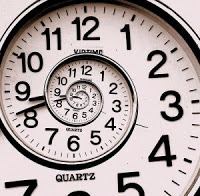 Recognize that what appears as a block may be a matter of timing. If you've written as deeply into a story as you can and find yourself unable to continue, it may be that you need more life experience (or research) before you're ready to go on.
Recognize that what appears as a block may be a matter of timing. If you've written as deeply into a story as you can and find yourself unable to continue, it may be that you need more life experience (or research) before you're ready to go on.Instead of calling yourself "blocked," welcome the break...to do research, to work on a different project or to get on with your life, trusting that you'll know when it's time to get back to it.
6. Passion
If you're feeling stuck, ask yourself whether the story is one that excites and impassions you, one that fires you up more than anything else you could be writing. Is it the right idea for you right now? Or is it just another good idea that anyone could write.
If you've lost the excitement (or never had it) and cannot rekindle your enthusiasm, consider that this may not be the best project for you at this time.
Lack of passion is a guaranteed recipe for stuckness. Passion, on the other hand, will always fuel your writing.
7. Self-Respect
Respect yourself and your writing. Respect every draft. Every word.
The more you beat yourself up over your writing, output or creative ability, the more you're inviting the kind of paralysis that feeds writer's block.
Discard judgment and punishing discipline. Cultivate discernment and discipleship. Recognize that every word, draft and emotion is an integral part of your creative journey. Honor all aspects of that journey -- including the painfully uncomfortable ones -- and writer's block will become a myth for you, too.
(c) 2009-11 Mark David Gerson
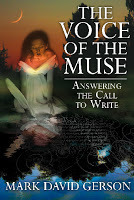 • For more videos about writing and the creative process, visit my YouTube page.
• For more videos about writing and the creative process, visit my YouTube page.• You'll find additional tips and inspiration on my web site, where you can read my "Rules for Writing," sign up for my mailing list and read/hear free excerpts from The Voice of the Muse: Answering the Call to Write, from which this piece was adapted.
Buy The Voice of the Muse: Answering the Call to Write and The Voice of the Muse Companion: Guided Meditations for Writers from my online bookstore, and be sure to ask for a signed copy of the book. The book is also available at BN.com, and both book and CD are on Amazon
 . Click here to find a compatible ebook version or an MP3 download of the CD.
. Click here to find a compatible ebook version or an MP3 download of the CD.• "Writer's Block" message pad available from TheDailyPlanner.com• Writer's block cartoon by Rusty-Siccors
 Please "like" these Facebook pages:•
The Voice of the Muse book
•
The MoonQuest movie
•
The MoonQuest book
• Mark David Gerson
Please "like" these Facebook pages:•
The Voice of the Muse book
•
The MoonQuest movie
•
The MoonQuest book
• Mark David Gerson
Published on November 16, 2011 10:11
November 11, 2011
Acts of Surrender 9 (Revisited): The Heart of Rebirth
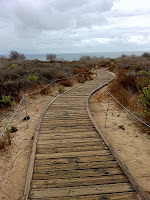 Today is Armistice Day in the UK, Remembrance Day in Canada and Veteran's Day here in the U.S. It's also a day (11/11/11) fraught with numerological and metaphysical meaning. And while it's all those things, it's also the 44th (gasp) anniversary of my bar mitzvah, which took place on November 11 of Canada's centennial year, oddly, five weeks after my actual birthday.
Today is Armistice Day in the UK, Remembrance Day in Canada and Veteran's Day here in the U.S. It's also a day (11/11/11) fraught with numerological and metaphysical meaning. And while it's all those things, it's also the 44th (gasp) anniversary of my bar mitzvah, which took place on November 11 of Canada's centennial year, oddly, five weeks after my actual birthday.To mark that, I'm reprinting this excerpt from my Acts of Surrender: A Journey Beyond Faith, my memoir-in-progress. I originally posted it last year, a few days before my 56th birthday. It talks about birthdays, including my bar mitzvah, birth and rebirth, and the never ending journey into the unknown that is the human journey, when it's lived at its most authentic.
As a side note, I was living in California when I wrote this, without the remotest expectation that, two weeks later, I would decamp and return to New Mexico for another leg in this infinite journey of surprise...

September 27, 2010 Costa Mesa, CA
In six days I'll be 56. Five days, really, if you figure that here in California the hour of my birth falls on October 2. (I was born just the other side of midnight, Montreal time, on October 3.)
So far, this is showing up as perhaps the strangest — and potentially most powerful — birthday ever.
I don't remember anything about my childhood birthdays. I don't remember parties, though there must have been some. I don't remember presents, though I know I received them.
You'd think I'd remember my 18th or 21st — landmarks in any journey to adulthood. But those, too, are blanks.
 My 20th stands out because that's when I moved out of the parental home and into my first apartment. But I don't recall whatever celebration must have surrounded that.
My 20th stands out because that's when I moved out of the parental home and into my first apartment. But I don't recall whatever celebration must have surrounded that.The only early birthday it would be impossible for just about any Jewish boy to forget was my 13th. Even then, October 3 is overshadowed by my November 11 bar mitzvah, itself a blur of wobbly knees and congratulatory hugs from people I barely knew, including the so-called friends who surrounded me at the reception. So-called, because I only had one close friend back then. The rest were filler.
My clearest memory of that day, apart from nervousness, was of looking down from the bimah, the stage-like platform from which I would sing my Torah portion, to see my father watching me intently from his wheelchair, a white-clad orderly at his side. By then, nine months to the day before his death, he was already a full-time resident of the Grace Dart Convalescent Hospital, increasingly incapacitated by the diabetes that had weakened his vision and heart, stolen his sexual potency and ended his architectural practice. He must have been proud that morning, but I never knew it...never really knew him.
That week's Torah portion, the one I'd spent months learning in a bearded rabbi's dark study, was Lech L'cha, the third Sabbath reading of the Jewish year (Genesis 12:1–17:27). In it, God commands Abram (not yet renamed Abraham) to "lech l'cha," to "go forth" to a strange land.
The Lord said to Abram,
Go forth from your native land and from your father's house
to the land that I will show you.
 At age 75, accompanied by his wife, Sara, and nephew Lot, Abram left all that he knew and followed that higher imperative into unknown territory.
At age 75, accompanied by his wife, Sara, and nephew Lot, Abram left all that he knew and followed that higher imperative into unknown territory.I couldn't know, at age 13, how fully that call would play out in my life...and on future birthdays.
Three months before my 29th birthday, I left my native Montreal to launch a new life in Toronto.
On September 30, 1994, I left Toronto, having sold most everything I owned. Three days later, on my 40th birthday, I drove off the Princess of Acadia ferry for my rebirth in Nova Scotia.
A year later, again on my birthday, I knew it was time to return to Toronto, which I did seven weeks afterward.
Another new beginning occurred on October 3 the following year, when I once again left Toronto, this time for Penetanguishene, two hours north of Toronto on Lake Huron.
 A year after that, following another lech l'cha call and three months of full-time journeying, I arrived in Sedona, Arizona. This time, I truly had gone forth from my native land to one revealed to me by some higher inner power: I had left Canada and would not return.
A year after that, following another lech l'cha call and three months of full-time journeying, I arrived in Sedona, Arizona. This time, I truly had gone forth from my native land to one revealed to me by some higher inner power: I had left Canada and would not return.In 2004, a month after my 50th birthday, my marriage ended, seemingly abruptly. Within weeks, another lech l'cha ensued. This full-time road odyssey lasted 30 months and dropped me in Albuquerque, New Mexico for yet another rebirth.
Today, less than a week from from this next birthday, that Torah portion carries its most potent significance yet.
When we're born, we arrive on this earth naked, vulnerable and fully reliant on a higher source for our every need. There's nothing to figure out, nothing to force. There's nothing we need to make happen, nothing we need to think about it. We feel our way through this new experience and carry an innate and inchoate knowingness that all is well. No faith, trust and surrender are required. No anxiety about the next moment exists. We carry no baggage of any sort, certainly no disempowering original sin.
"Now" is the only is that is. And being is the only imperative.
It's the ultimate lech l'cha. We've left our "father's house" for an alien land. Yet it's a land filled with promise.
I will make of you a great nation,
And I will bless you;
I will make your name great,
And you shall be a blessing.
I will bless those who bless you
And curse him that curses you;
And all the families of the earth
Shall bless themselves by you.
In Abram's life, there's nothing he needs to do in order for that promise to be fulfilled. The only call is to follow the imperative of the moment, which is the revelation of his deepest heart's desire. His job is to know, as does the newborn at some level, that all will be revealed in God's time...to take himself beyond the place of trust to the place of knowingness...to strip himself of all he has been in order to become all that he is destined to be. To become the "great nation" that is his birthright.
 It's difficult in moments for me to feel that a great nation awaits me on this birthday, six weeks after my most recent lech l'cha brought me to Southern California and the aptly named Spirit Street.
It's difficult in moments for me to feel that a great nation awaits me on this birthday, six weeks after my most recent lech l'cha brought me to Southern California and the aptly named Spirit Street.As much as I stripped away to get here — by selling off, giving away or throwing out most of my Albuquerque life — the shedding has been even more intense since I got here on August's Friday the 13th.
Somehow, I've found more material possessions to let go of. But more significant has been the emotional and psychological residue that has been peeled off me as harshly as if someone had yanked a dozen bandaids off my arm.
With a disturbing blend of joy, gratitude, pain and anxiety, I've seen all the ways in which my thoughts and actions have continued to support scarcity-thinking, codependence and disempowerment — even as I recognize how much of that patterning I've already let go of. I've seen, too, how plugged in I can still be to a world built on those dysfunctions and hypocrisies — even as I recognize how much unplugging I've already achieved.
Every day, I let go more and more of that. Every day, I leave behind more and more of the distractions that have kept me from me, that have kept me from the fullest recognition and expression of my deepest passions. Some of those distractions are behavioral and emotional. Others relate to my work and to the ways I've supported myself.
And every day, my bank account edges closer to zero.
Part of me is alarmed by what it perceives as a profound disconnect. "I'm doing the 'work,'" it says. "I'm doing what Abram did. I'm moving from a life of surrender to a life beyond surrender. Where's the payoff? Why am I teetering toward total financial collapse when I've been promised to be blessed as a great nation?"
 In reading, just now, of Abram's travels in Genesis, I see that his ride, too, wasn't an easy one. He encountered war, famine, separation and expulsion. Yet his path ultimately led to the promised blessing.
In reading, just now, of Abram's travels in Genesis, I see that his ride, too, wasn't an easy one. He encountered war, famine, separation and expulsion. Yet his path ultimately led to the promised blessing.That story reminds me, once again, to see the ongoing miracle that is my journey. Not only have I been supported magnificently (if sometimes uncomfortably) since committing to the move to Los Angeles, I've been supported just as wondrously (and unconventionally) at every step in the years leading up to it. Each act of surrender has brought gifts I could never have imagined, predicted or thought I desired.
Most recently, I never would have connected so profoundly with Adam had my iffy financial situation not brought us together. It's been a roller coaster ride of increasing acceleration for both of us — a blend of comradely exhilaration and button-pushing exasperation that I couldn't have consciously sought and wouldn't trade away.
In this moment, if nothing changes, my bank account will reach zero by my birthday. And if the smaller me is scared by that, the larger me sees the divine perfection in returning to that newborn state on the anniversary of my birth...on what, no doubt, is a metaphor for yet another rebirth.
What will my next new life look like? Part of me would have preferred to have an answer by the time I reached this sentence. Yet, despite that very human wish, I know that this new birth can no more be predicted than could any of its predecessors. How can I predict what I can't yet imagine?
All I know is that Abram's legacy is also mine, that I've never been let down and that if the bungee cord of my journey has dropped me this close to bottom, the laws of physics demand that the upward bounce be equally dramatic. Put another way, I've returned to the empty void that launched Genesis. By getting out of the way and letting my new world form as God did his, I'm guaranteed a creation at least as astounding as that one.
This is going to be one hell of a birthday.
Fear not, Abram,
I am a shield to you;
Your reward shall be very great.
Adapted from Acts of Surrender: A Writer's Journey Beyond Faith, my memoir-in-progress. Please share as you feel called to. But please, also, include a link back to this post.
Other Recent Excerpts: • August 21• November 15
• March 7
• May 22
• June 12
• July 9• July 19
 Please "like" these Facebook pages:•
The Voice of the Muse book
•
The MoonQuest movie
•
The MoonQuest book
• Mark David Gerson
Please "like" these Facebook pages:•
The Voice of the Muse book
•
The MoonQuest movie
•
The MoonQuest book
• Mark David Gerson
Published on November 11, 2011 10:11
November 1, 2011
Mark David's Musings on Creativity
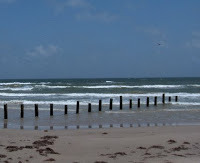 This interview on creativity, the Muse and the creative process originally appeared last month on author Bill Jones, Jr.'s blog, This Page Is Intentionally Blank.
This interview on creativity, the Muse and the creative process originally appeared last month on author Bill Jones, Jr.'s blog, This Page Is Intentionally Blank. An Interview with Mark David Gerson
Today's Fiction Friday interview is with author, screenwriter and lecturer, mentor and coach Mark David Gerson. Welcome, Mark David!
~ Bill Jones, Jr., author of The Stream: Discovery
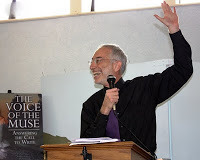 The Blank Blog: It's hard to pigeon-hole you with just one label. You're author, motivational speaker, screenwriter, mentor, photographer. … How do you see yourself? Is one of these titles more "you" than another?
The Blank Blog: It's hard to pigeon-hole you with just one label. You're author, motivational speaker, screenwriter, mentor, photographer. … How do you see yourself? Is one of these titles more "you" than another?Mark David Gerson: I'm so glad you're finding it hard to pigeon-hole me. I hate being slotted into categories and file folders! Seriously, whatever else I have done in my life, it all and always seems to come back to writing. As for the form (author v. screenwriter), I'm not sure that matters so much as the storytelling aspect of the enterprise.
In fact, now that I think about it as I write this (I do some of my best thinking while writing!), perhaps "storyteller" is the common factor in each of those labels. The bottom line is, whether I'm writing, speaking, coaching, mentoring, drawing or photographing, what I'm really doing is telling stories. From that perspective, the death of storytelling that figures so prominently in my novel The MoonQuest takes on an even more significant and personal dimension.
[image error] TBB: For those who haven't yet read The MoonQuest , can you tell us a little about the story?
MDG: Imagine a land where storytelling is banned, where storytellers have been put to death, where dreams and visions are outlawed, where imagination has been stripped from the land and its people. This is the Q'ntana of The MoonQuest, a land where, as Toshar, the main character, puts it, "'once upon a time' is a forbidden phrase and fact is the only legal tender." In this land, legend has it, the moon has been so saddened by the silence and tyranny, that she has cried tears that have extinguished her light. As a result, the moon has not been seen for many generations. The MoonQuest, then, is the journey undertaken by a reluctant Toshar and his three companions to restore story and vision to the land and to rekindle the light of the moon.
TBB: The MoonQuest has won awards and accolades. Now, I see it is a trilogy, which can be both exciting and challenging. How do you balance ensuring you have new stories to tell, with keeping the tone and quality of the original book?
 MDG: Yes, The MoonQuest has won five awards, including an Independent Publishers Award Gold Medal IPPY and a New Mexico Book Award. And while no one writes for the awards, they are still wonderfully gratifying and validating.
MDG: Yes, The MoonQuest has won five awards, including an Independent Publishers Award Gold Medal IPPY and a New Mexico Book Award. And while no one writes for the awards, they are still wonderfully gratifying and validating.Fortunately, that balance you asked about is not part of my job description. My job is to listen for the stories that already exist in the airwaves through which my Muse broadcasts and then to put them into words to the best of my imperfect ability. Or put another way, my job is to write the book my story wants written — the way it wants it written.
While I knew from the outset that The MoonQuest would launch a trilogy, and even knew the titles of the sequels early on, I had no idea what The StarQuest and The SunQuest would be about or how they would work with The MoonQuest story. Now that I have written several drafts of The StarQuest book and have completed screenplay versions of both — in other words, now that I finally know the story! — I'm amazed and in awe. My mind could never have worked those puzzle pieces together on its own. Which is why, when it comes to writing, my credos are "the story is smarter than I am" and "the story knows best"!
TBB: Can you tell us about your venture into screenwriting and filmmaking? How was the transition from book to film?
MDG: I'm finding the whole process of working with the same story in two forms (novel and screenplay) fascinating and illuminating.
I wrote the first draft of The MoonQuest novel in the third person. But all subsequent drafts, as well as The StarQuest novel, are in the first person. Writing screenplay adaptations offers me the rare privilege of telling the same story twice, each from a different point of view: first person in the novel, third person in the screenplay.
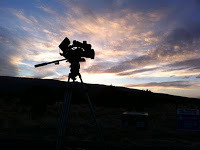 As well, each version has fed the others. I wrote the first draft of The MoonQuest screenplay when I thought I already had a completed, publication-ready draft of the novel. But some of the changes I made in the story for the screenplay were so compelling that I went back and retrofitted them into the manuscript. I've had similar experiences going back and forth between the The StarQuest novel manuscript and screenplay.
As well, each version has fed the others. I wrote the first draft of The MoonQuest screenplay when I thought I already had a completed, publication-ready draft of the novel. But some of the changes I made in the story for the screenplay were so compelling that I went back and retrofitted them into the manuscript. I've had similar experiences going back and forth between the The StarQuest novel manuscript and screenplay.I had never adapted a novel for film when I began The MoonQuest script, let alone tackled any kind of screenplay. And although I read some great books and received some terrific and inspiring instruction at The Screenwriters Conference in Santa Fe (where I was, a few years later, gratifyingly back as an instructor), I approached the adaptation the way I approach all my writing: by trusting that the story itself would guide me. Which it did…well enough that a production company is seeking to produce my screenplay.
TBB: You must be pretty busy with all your interests. How do you balance your time?
MDG: I take the same intuitive approach to my life as I do to my writing. While other coaches and instructors recommend applying a regular routine to creative production, that never works for me for very long. Rather, I remain as in-the-moment as I can and follow wherever the inspiration leads me — in my life as well as in my writing. That way of living and writing is both exhilarating and, at times, terrifying. But it does keep things in an organic balance!
[image error] TBB: In your book, The Voice of the Muse: Answering the Call to Write , you have a chapter entitled, "Thirteen Rules for Birthing Your Book." I won't list them all here, because folks need to buy the book. My favorite is "Your book is older than you think." Can you expound on that a little here?
MDG: My point with this so-called rule ("so-called" because my Rule #1 for everything is that, truly, there are none!) is a version of what I said here earlier, that our stories exist in the airwaves around us. More often than not, they've been hovering there for a long time, patiently waiting for us first to take notice, then to take action…"to allow the ideas of your heart," as I put it in The Voice of the Muse "to find expression through your mind." That allowing is important. As I suggested in answer to your previous question, creation (like life) is not about forcing things to happen. Creation is about listening for those timeless stories and then letting them sift through us onto the page. Like the God of Genesis, our job is to let creation happen.
TBB: I love to ask writers this one. What book(s) do you wish you'd written? Why?
MDG: I could say that I wish I had already written and completed The StarQuest and The SunQuest! Then, like Toshar in The MoonQuest, I would be free to "move on to other realms, set off on other journeys." Seriously, though, that's a question I've never considered. And while there are many, many authors I admire and many, many books I have loved over the years, I'm not sure that there any I wish I'd written, because that would mean I would have to have been someone other than myself with a voice other than my own to have accomplished it. With that disclaimer out of the way, the one book — or series of books — that leaps to mind are the Narnia books, probably for their engaging blend of adventure and subtle spirituality.
 TBB: For those of us with very shy muses, how would you suggest we coax ours to cooperate more readily?
TBB: For those of us with very shy muses, how would you suggest we coax ours to cooperate more readily?MDG: You may not like this answer… Muses are never shy. It's writers who are deaf or, rather, choose not to listen. Muses are never uncooperative. It's writers who refuse to cooperate. Muses never hold back. Writers hold back all the time!
In those moments when you believe your Muse is not working with you, it's important to look within. What are we not willing to hear? Which story are we refusing to write? What are we reluctant to face within ourselves that would emerge in a story we are doing our best to ignore? Which belief or way of life is our Muse challenging? Where are we not surrendering unconditionally to our Muse, and to the story it has for us?
Answer those questions, move forward in your writing from those answers, and I'm fairly certain you'll never encounter a shy, uncooperative Muse again!
TBB: Being a photographer as well as a writer, I take a lot of inspiration from photographs. In effect, the camera is my muse. How did you create the world in The Q'ntana Trilogy?
MDG: I'm not sure I can answer the question, for reasons that may have already become apparent from my previous answers. I didn't consciously create the Q'ntana worlds. I allowed them to spill through me onto the page. I didn't plan, plot or prepare. I simply wrote and the worlds created themselves through the words that found their way through me.
 In fact, I had no plans to write a MoonQuest, nor did I have a conscious desire to write a fantasy novel, let alone a trilogy. The MoonQuest birthed itself during a writing workshop I was facilitating when, in an unprecedented in-the-moment inspiration, I did the same exercise I had presented to participants. What I wrote that evening became the opening scene of the first draft of a novel I knew nothing about. From there, I just kept writing, discovering the story as I went along, until I was done. The StarQuest and SunQuest stories emerged similarly. (I wrote about that magical MoonQuest experience on my blog.)
In fact, I had no plans to write a MoonQuest, nor did I have a conscious desire to write a fantasy novel, let alone a trilogy. The MoonQuest birthed itself during a writing workshop I was facilitating when, in an unprecedented in-the-moment inspiration, I did the same exercise I had presented to participants. What I wrote that evening became the opening scene of the first draft of a novel I knew nothing about. From there, I just kept writing, discovering the story as I went along, until I was done. The StarQuest and SunQuest stories emerged similarly. (I wrote about that magical MoonQuest experience on my blog.)TBB: What do you like most about your work? What do you want people to take from it?
MDG: In The Voice of the Muse: Answering the Call to Write, I encourage readers to abandon control, because trying to control the creative process is, at worst, a sure ticket to writer's block. At best, it produces unimaginative, formulaic results. The same applies in our lives. The more control and rigidity we apply, the fewer miracles we experience.
I love that my work is about inspiring people to open to that kind of freedom, the freedom to live and create from the deepest heart of our being, the freedom to be in the moment — in our lives as much as in our creativity. For isn't life the ultimate creative act?
If you take one thing from my work, I would hope it would be to see the possibility of that freedom and to discover some first steps toward achieving it.
TBB: You are granted one wish, and are allowed to choose any writer, living or dead, as your mentor? Whom do you choose?
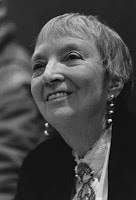 MDG: I'd probably choose Madeleine L'Engle, author of A Wrinkle in Time. I didn't discover A Wrinkle in Time and its sequels until I was an adult, when I also discovered, through her nonfiction writings, L'Engle's deep spirituality, one that informed her creativity and her life. While L'Engle's spirituality found its expression through the Episcopal Church and mine is largely unstructured, she was a profound influence on my writing and my life. In a sense, she already was a mentor without knowing it. Now, if she were still alive, I'd just like to thank her for that.
MDG: I'd probably choose Madeleine L'Engle, author of A Wrinkle in Time. I didn't discover A Wrinkle in Time and its sequels until I was an adult, when I also discovered, through her nonfiction writings, L'Engle's deep spirituality, one that informed her creativity and her life. While L'Engle's spirituality found its expression through the Episcopal Church and mine is largely unstructured, she was a profound influence on my writing and my life. In a sense, she already was a mentor without knowing it. Now, if she were still alive, I'd just like to thank her for that.TBB: How can readers find your work?
MDG: Both The MoonQuest: A True Fantasy and The Voice of the Muse: Answering the Call to Write are available on my website's online bookstore, as is my CD recording, The Voice of the Muse Companion: Guided Meditations for Writers. You'll also find excerpts from all three on my site. By the way, a bonus of ordering from my website is that I can sign the books, which I'm happy to do, for those who are interested.
 Hard copy versions of both books are also available online at Amazon.com
Hard copy versions of both books are also available online at Amazon.com and Barnes & Noble.
and Barnes & Noble.Visit my online bookstore for links to the ebook versions of The MoonQuest and The Voice of the Muse (Kindle, Nook, Kobo and iBooks) and for a downloadable MP3 version of The Voice of the Muse Companion.
Finally, you can find/contact me through my website and blog and through Facebook and Google+.
The original interview on Bill Jones's blog Bill Jones's author page on Facebook
Photo/Art Credits: Mark David Gerson by Peggy Spencer; San Padre Island National Seashore and "movie camera at dusk" by Mark David Gerson; Madeleine L'Engle by unknown; MoonQuest book cover by Angela Farley; Voice of the Muse cover and Q'ntana Trilogy artwork by Richard Crookes.
 Please "like" these Facebook pages:•
The Voice of the Muse book
•
The MoonQuest movie
•
The MoonQuest book
Please "like" these Facebook pages:•
The Voice of the Muse book
•
The MoonQuest movie
•
The MoonQuest book
• Mark David Gerson
Published on November 01, 2011 00:11
Musings on Creativity
This interview originally appeared last month on author Bill Jones, Jr.'s blog, This Page Is Intentionally Blank.
An Interview with Mark David Gerson
 Today's Fiction Friday interview is with author, screenwriter and lecturer, mentor and coach Mark David Gerson. Welcome, Mark David!
Today's Fiction Friday interview is with author, screenwriter and lecturer, mentor and coach Mark David Gerson. Welcome, Mark David!
~ Bill Jones, Jr., author of The Stream: Discovery
The Blank Blog: It's hard to pigeon-hole you with just one label. You're author, motivational speaker, screenwriter, mentor, photographer. … How do you see yourself? Is one of these titles more "you" than another?
Mark David Gerson: I'm so glad you're finding it hard to pigeon-hole me. I hate being slotted into categories and file folders! Seriously, whatever else I have done in my life, it all and always seems to come back to writing. As for the form (author v. screenwriter), I'm not sure that matters so much as the storytelling aspect of the enterprise.
In fact, now that I think about it as I write this (I do some of my best thinking while writing!), perhaps "storyteller" is the common factor in each of those labels. The bottom line is, whether I'm writing, speaking, coaching, mentoring, drawing or photographing, what I'm really doing is telling stories. From that perspective, the death of storytelling that figures so prominently in my novel The MoonQuest takes on an even more significant and personal dimension.
[image error] TBB: For those who haven't yet read The MoonQuest , can you tell us a little about the story?
MDG: Imagine a land where storytelling is banned, where storytellers have been put to death, where dreams and visions are outlawed, where imagination has been stripped from the land and its people. This is the Q'ntana of The MoonQuest, a land where, as Toshar, the main character, puts it, "'once upon a time' is a forbidden phrase and fact is the only legal tender." In this land, legend has it, the moon has been so saddened by the silence and tyranny, that she has cried tears that have extinguished her light. As a result, the moon has not been seen for many generations. The MoonQuest, then, is the journey undertaken by a reluctant Toshar and his three companions to restore story and vision to the land and to rekindle the light of the moon.
TBB: The MoonQuest has won awards and accolades. Now, I see it is a trilogy, which can be both exciting and challenging. How do you balance ensuring you have new stories to tell, with keeping the tone and quality of the original book?
 MDG: Yes, The MoonQuest has won five awards, including an Independent Publishers Award Gold Medal IPPY and a New Mexico Book Award. And while no one writes for the awards, they are still wonderfully gratifying and validating.
MDG: Yes, The MoonQuest has won five awards, including an Independent Publishers Award Gold Medal IPPY and a New Mexico Book Award. And while no one writes for the awards, they are still wonderfully gratifying and validating.
Fortunately, that balance you asked about is not part of my job description. My job is to listen for the stories that already exist in the airwaves through which my Muse broadcasts and then to put them into words to the best of my imperfect ability. Or put another way, my job is to write the book my story wants written — the way it wants it written.
While I knew from the outset that The MoonQuest would launch a trilogy, and even knew the titles of the sequels early on, I had no idea what The StarQuest and The SunQuest would be about or how they would work with The MoonQuest story. Now that I have written several drafts of The StarQuest book and have completed screenplay versions of both — in other words, now that I finally know the story! — I'm amazed and in awe. My mind could never have worked those puzzle pieces together on its own. Which is why, when it comes to writing, my credos are "the story is smarter than I am" and "the story knows best"!
TBB: Can you tell us about your venture into screenwriting and filmmaking? How was the transition from book to film?
MDG: I'm finding the whole process of working with the same story in two forms (novel and screenplay) fascinating and illuminating.
I wrote the first draft of The MoonQuest novel in the third person. But all subsequent drafts, as well as The StarQuest novel, are in the first person. Writing screenplay adaptations offers me the rare privilege of telling the same story twice, each from a different point of view: first person in the novel, third person in the screenplay.
 As well, each version has fed the others. I wrote the first draft of The MoonQuest screenplay when I thought I already had a completed, publication-ready draft of the novel. But some of the changes I made in the story for the screenplay were so compelling that I went back and retrofitted them into the manuscript. I've had similar experiences going back and forth between the The StarQuest novel manuscript and screenplay.
As well, each version has fed the others. I wrote the first draft of The MoonQuest screenplay when I thought I already had a completed, publication-ready draft of the novel. But some of the changes I made in the story for the screenplay were so compelling that I went back and retrofitted them into the manuscript. I've had similar experiences going back and forth between the The StarQuest novel manuscript and screenplay.
I had never adapted a novel for film when I began The MoonQuest script, let alone tackled any kind of screenplay. And although I read some great books and received some terrific and inspiring instruction at The Screenwriters Conference in Santa Fe (where I was, a few years later, gratifyingly back as an instructor), I approached the adaptation the way I approach all my writing: by trusting that the story itself would guide me. Which it did…well enough that a production company is seeking to produce my screenplay.
TBB: You must be pretty busy with all your interests. How do you balance your time?
MDG: I take the same intuitive approach to my life as I do to my writing. While other coaches and instructors recommend applying a regular routine to creative production, that never works for me for very long. Rather, I remain as in-the-moment as I can and follow wherever the inspiration leads me — in my life as well as in my writing. That way of living and writing is both exhilarating and, at times, terrifying. But it does keep things in an organic balance!
[image error] TBB: In your book, The Voice of the Muse: Answering the Call to Write , you have a chapter entitled, "Thirteen Rules for Birthing Your Book." I won't list them all here, because folks need to buy the book. My favorite is "Your book is older than you think." Can you expound on that a little here?
MDG: My point with this so-called rule ("so-called" because my Rule #1 for everything is that, truly, there are none!) is a version of what I said here earlier, that our stories exist in the airwaves around us. More often than not, they've been hovering there for a long time, patiently waiting for us first to take notice, then to take action…"to allow the ideas of your heart," as I put it in The Voice of the Muse "to find expression through your mind." That allowing is important. As I suggested in answer to your previous question, creation (like life) is not about forcing things to happen. Creation is about listening for those timeless stories and then letting them sift through us onto the page. Like the God of Genesis, our job is to let creation happen.
TBB: I love to ask writers this one. What book(s) do you wish you'd written? Why?
MDG: I could say that I wish I had already written and completed The StarQuest and The SunQuest! Then, like Toshar in The MoonQuest, I would be free to "move on to other realms, set off on other journeys." Seriously, though, that's a question I've never considered. And while there are many, many authors I admire and many, many books I have loved over the years, I'm not sure that there any I wish I'd written, because that would mean I would have to have been someone other than myself with a voice other than my own to have accomplished it. With that disclaimer out of the way, the one book — or series of books — that leaps to mind are the Narnia books, probably for their engaging blend of adventure and subtle spirituality.
 TBB: For those of us with very shy muses, how would you suggest we coax ours to cooperate more readily?
TBB: For those of us with very shy muses, how would you suggest we coax ours to cooperate more readily?
MDG: You may not like this answer… Muses are never shy. It's writers who are deaf or, rather, choose not to listen. Muses are never uncooperative. It's writers who refuse to cooperate. Muses never hold back. Writers hold back all the time!
In those moments when you believe your Muse is not working with you, it's important to look within. What are we not willing to hear? Which story are we refusing to write? What are we reluctant to face within ourselves that would emerge in a story we are doing our best to ignore? Which belief or way of life is our Muse challenging? Where are we not surrendering unconditionally to our Muse, and to the story it has for us?
Answer those questions, move forward in your writing from those answers, and I'm fairly certain you'll never encounter a shy, uncooperative Muse again!
TBB: Being a photographer as well as a writer, I take a lot of inspiration from photographs. In effect, the camera is my muse. How did you create the world in The Q'ntana Trilogy?
MDG: I'm not sure I can answer the question, for reasons that may have already become apparent from my previous answers. I didn't consciously create the Q'ntana worlds. I allowed them to spill through me onto the page. I didn't plan, plot or prepare. I simply wrote and the worlds created themselves through the words that found their way through me.
 In fact, I had no plans to write a MoonQuest, nor did I have a conscious desire to write a fantasy novel, let alone a trilogy. The MoonQuest birthed itself during a writing workshop I was facilitating when, in an unprecedented in-the-moment inspiration, I did the same exercise I had presented to participants. What I wrote that evening became the opening scene of the first draft of a novel I knew nothing about. From there, I just kept writing, discovering the story as I went along, until I was done. The StarQuest and SunQuest stories emerged similarly. (I wrote about that magical MoonQuest experience on my blog.)
In fact, I had no plans to write a MoonQuest, nor did I have a conscious desire to write a fantasy novel, let alone a trilogy. The MoonQuest birthed itself during a writing workshop I was facilitating when, in an unprecedented in-the-moment inspiration, I did the same exercise I had presented to participants. What I wrote that evening became the opening scene of the first draft of a novel I knew nothing about. From there, I just kept writing, discovering the story as I went along, until I was done. The StarQuest and SunQuest stories emerged similarly. (I wrote about that magical MoonQuest experience on my blog.)
TBB: What do you like most about your work? What do you want people to take from it?
MDG: In The Voice of the Muse: Answering the Call to Write, I encourage readers to abandon control, because trying to control the creative process is, at worst, a sure ticket to writer's block. At best, it produces unimaginative, formulaic results. The same applies in our lives. The more control and rigidity we apply, the fewer miracles we experience.
I love that my work is about inspiring people to open to that kind of freedom, the freedom to live and create from the deepest heart of our being, the freedom to be in the moment — in our lives as much as in our creativity. For isn't life the ultimate creative act?
If you take one thing from my work, I would hope it would be to see the possibility of that freedom and to discover some first steps toward achieving it.
TBB: You are granted one wish, and are allowed to choose any writer, living or dead, as your mentor? Whom do you choose?
 MDG: I'd probably choose Madeleine L'Engle, author of A Wrinkle in Time. I didn't discover A Wrinkle in Time and its sequels until I was an adult, when I also discovered, through her nonfiction writings, L'Engle's deep spirituality, one that informed her creativity and her life. While L'Engle's spirituality found its expression through the Episcopal Church and mine is largely unstructured, she was a profound influence on my writing and my life. In a sense, she already was a mentor without knowing it. Now, if she were still alive, I'd just like to thank her for that.
MDG: I'd probably choose Madeleine L'Engle, author of A Wrinkle in Time. I didn't discover A Wrinkle in Time and its sequels until I was an adult, when I also discovered, through her nonfiction writings, L'Engle's deep spirituality, one that informed her creativity and her life. While L'Engle's spirituality found its expression through the Episcopal Church and mine is largely unstructured, she was a profound influence on my writing and my life. In a sense, she already was a mentor without knowing it. Now, if she were still alive, I'd just like to thank her for that.
TBB: How can readers find your work?
MDG: Both The MoonQuest: A True Fantasy and The Voice of the Muse: Answering the Call to Write are available on my website's online bookstore, as is my CD recording, The Voice of the Muse Companion: Guided Meditations for Writers. You'll also find excerpts from all three on my site. By the way, a bonus of ordering from my website is that I can sign the books, which I'm happy to do, for those who are interested.
 Hard copy versions of both books are also available online at Amazon.com
Hard copy versions of both books are also available online at Amazon.com and Barnes & Noble.
and Barnes & Noble.
Visit my online bookstore for links to the ebook versions of The MoonQuest and The Voice of the Muse (Kindle, Nook, Kobo and iBooks) and for a downloadable MP3 version of The Voice of the Muse Companion.
Finally, you can find/contact me through my website and blog and through Facebook and Google+.
The original interview on Bill Jones's blog Bill Jones's author page on Facebook
Photo/Art Credits: Mark David Gerson by Peggy Spencer; "movie camera at dusk" by Mark David Gerson; Madeleine L'Engle by unknown; MoonQuest book cover by Angela Farley; Voice of the Muse cover and Q'ntana Trilogy artwork by Richard Crookes.
 Please "like" these Facebook pages:•
The Voice of the Muse book
•
The MoonQuest movie
•
The MoonQuest book
• Mark David Gerson
Please "like" these Facebook pages:•
The Voice of the Muse book
•
The MoonQuest movie
•
The MoonQuest book
• Mark David Gerson
An Interview with Mark David Gerson
 Today's Fiction Friday interview is with author, screenwriter and lecturer, mentor and coach Mark David Gerson. Welcome, Mark David!
Today's Fiction Friday interview is with author, screenwriter and lecturer, mentor and coach Mark David Gerson. Welcome, Mark David! ~ Bill Jones, Jr., author of The Stream: Discovery
The Blank Blog: It's hard to pigeon-hole you with just one label. You're author, motivational speaker, screenwriter, mentor, photographer. … How do you see yourself? Is one of these titles more "you" than another?
Mark David Gerson: I'm so glad you're finding it hard to pigeon-hole me. I hate being slotted into categories and file folders! Seriously, whatever else I have done in my life, it all and always seems to come back to writing. As for the form (author v. screenwriter), I'm not sure that matters so much as the storytelling aspect of the enterprise.
In fact, now that I think about it as I write this (I do some of my best thinking while writing!), perhaps "storyteller" is the common factor in each of those labels. The bottom line is, whether I'm writing, speaking, coaching, mentoring, drawing or photographing, what I'm really doing is telling stories. From that perspective, the death of storytelling that figures so prominently in my novel The MoonQuest takes on an even more significant and personal dimension.
[image error] TBB: For those who haven't yet read The MoonQuest , can you tell us a little about the story?
MDG: Imagine a land where storytelling is banned, where storytellers have been put to death, where dreams and visions are outlawed, where imagination has been stripped from the land and its people. This is the Q'ntana of The MoonQuest, a land where, as Toshar, the main character, puts it, "'once upon a time' is a forbidden phrase and fact is the only legal tender." In this land, legend has it, the moon has been so saddened by the silence and tyranny, that she has cried tears that have extinguished her light. As a result, the moon has not been seen for many generations. The MoonQuest, then, is the journey undertaken by a reluctant Toshar and his three companions to restore story and vision to the land and to rekindle the light of the moon.
TBB: The MoonQuest has won awards and accolades. Now, I see it is a trilogy, which can be both exciting and challenging. How do you balance ensuring you have new stories to tell, with keeping the tone and quality of the original book?
 MDG: Yes, The MoonQuest has won five awards, including an Independent Publishers Award Gold Medal IPPY and a New Mexico Book Award. And while no one writes for the awards, they are still wonderfully gratifying and validating.
MDG: Yes, The MoonQuest has won five awards, including an Independent Publishers Award Gold Medal IPPY and a New Mexico Book Award. And while no one writes for the awards, they are still wonderfully gratifying and validating.Fortunately, that balance you asked about is not part of my job description. My job is to listen for the stories that already exist in the airwaves through which my Muse broadcasts and then to put them into words to the best of my imperfect ability. Or put another way, my job is to write the book my story wants written — the way it wants it written.
While I knew from the outset that The MoonQuest would launch a trilogy, and even knew the titles of the sequels early on, I had no idea what The StarQuest and The SunQuest would be about or how they would work with The MoonQuest story. Now that I have written several drafts of The StarQuest book and have completed screenplay versions of both — in other words, now that I finally know the story! — I'm amazed and in awe. My mind could never have worked those puzzle pieces together on its own. Which is why, when it comes to writing, my credos are "the story is smarter than I am" and "the story knows best"!
TBB: Can you tell us about your venture into screenwriting and filmmaking? How was the transition from book to film?
MDG: I'm finding the whole process of working with the same story in two forms (novel and screenplay) fascinating and illuminating.
I wrote the first draft of The MoonQuest novel in the third person. But all subsequent drafts, as well as The StarQuest novel, are in the first person. Writing screenplay adaptations offers me the rare privilege of telling the same story twice, each from a different point of view: first person in the novel, third person in the screenplay.
 As well, each version has fed the others. I wrote the first draft of The MoonQuest screenplay when I thought I already had a completed, publication-ready draft of the novel. But some of the changes I made in the story for the screenplay were so compelling that I went back and retrofitted them into the manuscript. I've had similar experiences going back and forth between the The StarQuest novel manuscript and screenplay.
As well, each version has fed the others. I wrote the first draft of The MoonQuest screenplay when I thought I already had a completed, publication-ready draft of the novel. But some of the changes I made in the story for the screenplay were so compelling that I went back and retrofitted them into the manuscript. I've had similar experiences going back and forth between the The StarQuest novel manuscript and screenplay.I had never adapted a novel for film when I began The MoonQuest script, let alone tackled any kind of screenplay. And although I read some great books and received some terrific and inspiring instruction at The Screenwriters Conference in Santa Fe (where I was, a few years later, gratifyingly back as an instructor), I approached the adaptation the way I approach all my writing: by trusting that the story itself would guide me. Which it did…well enough that a production company is seeking to produce my screenplay.
TBB: You must be pretty busy with all your interests. How do you balance your time?
MDG: I take the same intuitive approach to my life as I do to my writing. While other coaches and instructors recommend applying a regular routine to creative production, that never works for me for very long. Rather, I remain as in-the-moment as I can and follow wherever the inspiration leads me — in my life as well as in my writing. That way of living and writing is both exhilarating and, at times, terrifying. But it does keep things in an organic balance!
[image error] TBB: In your book, The Voice of the Muse: Answering the Call to Write , you have a chapter entitled, "Thirteen Rules for Birthing Your Book." I won't list them all here, because folks need to buy the book. My favorite is "Your book is older than you think." Can you expound on that a little here?
MDG: My point with this so-called rule ("so-called" because my Rule #1 for everything is that, truly, there are none!) is a version of what I said here earlier, that our stories exist in the airwaves around us. More often than not, they've been hovering there for a long time, patiently waiting for us first to take notice, then to take action…"to allow the ideas of your heart," as I put it in The Voice of the Muse "to find expression through your mind." That allowing is important. As I suggested in answer to your previous question, creation (like life) is not about forcing things to happen. Creation is about listening for those timeless stories and then letting them sift through us onto the page. Like the God of Genesis, our job is to let creation happen.
TBB: I love to ask writers this one. What book(s) do you wish you'd written? Why?
MDG: I could say that I wish I had already written and completed The StarQuest and The SunQuest! Then, like Toshar in The MoonQuest, I would be free to "move on to other realms, set off on other journeys." Seriously, though, that's a question I've never considered. And while there are many, many authors I admire and many, many books I have loved over the years, I'm not sure that there any I wish I'd written, because that would mean I would have to have been someone other than myself with a voice other than my own to have accomplished it. With that disclaimer out of the way, the one book — or series of books — that leaps to mind are the Narnia books, probably for their engaging blend of adventure and subtle spirituality.
 TBB: For those of us with very shy muses, how would you suggest we coax ours to cooperate more readily?
TBB: For those of us with very shy muses, how would you suggest we coax ours to cooperate more readily?MDG: You may not like this answer… Muses are never shy. It's writers who are deaf or, rather, choose not to listen. Muses are never uncooperative. It's writers who refuse to cooperate. Muses never hold back. Writers hold back all the time!
In those moments when you believe your Muse is not working with you, it's important to look within. What are we not willing to hear? Which story are we refusing to write? What are we reluctant to face within ourselves that would emerge in a story we are doing our best to ignore? Which belief or way of life is our Muse challenging? Where are we not surrendering unconditionally to our Muse, and to the story it has for us?
Answer those questions, move forward in your writing from those answers, and I'm fairly certain you'll never encounter a shy, uncooperative Muse again!
TBB: Being a photographer as well as a writer, I take a lot of inspiration from photographs. In effect, the camera is my muse. How did you create the world in The Q'ntana Trilogy?
MDG: I'm not sure I can answer the question, for reasons that may have already become apparent from my previous answers. I didn't consciously create the Q'ntana worlds. I allowed them to spill through me onto the page. I didn't plan, plot or prepare. I simply wrote and the worlds created themselves through the words that found their way through me.
 In fact, I had no plans to write a MoonQuest, nor did I have a conscious desire to write a fantasy novel, let alone a trilogy. The MoonQuest birthed itself during a writing workshop I was facilitating when, in an unprecedented in-the-moment inspiration, I did the same exercise I had presented to participants. What I wrote that evening became the opening scene of the first draft of a novel I knew nothing about. From there, I just kept writing, discovering the story as I went along, until I was done. The StarQuest and SunQuest stories emerged similarly. (I wrote about that magical MoonQuest experience on my blog.)
In fact, I had no plans to write a MoonQuest, nor did I have a conscious desire to write a fantasy novel, let alone a trilogy. The MoonQuest birthed itself during a writing workshop I was facilitating when, in an unprecedented in-the-moment inspiration, I did the same exercise I had presented to participants. What I wrote that evening became the opening scene of the first draft of a novel I knew nothing about. From there, I just kept writing, discovering the story as I went along, until I was done. The StarQuest and SunQuest stories emerged similarly. (I wrote about that magical MoonQuest experience on my blog.)TBB: What do you like most about your work? What do you want people to take from it?
MDG: In The Voice of the Muse: Answering the Call to Write, I encourage readers to abandon control, because trying to control the creative process is, at worst, a sure ticket to writer's block. At best, it produces unimaginative, formulaic results. The same applies in our lives. The more control and rigidity we apply, the fewer miracles we experience.
I love that my work is about inspiring people to open to that kind of freedom, the freedom to live and create from the deepest heart of our being, the freedom to be in the moment — in our lives as much as in our creativity. For isn't life the ultimate creative act?
If you take one thing from my work, I would hope it would be to see the possibility of that freedom and to discover some first steps toward achieving it.
TBB: You are granted one wish, and are allowed to choose any writer, living or dead, as your mentor? Whom do you choose?
 MDG: I'd probably choose Madeleine L'Engle, author of A Wrinkle in Time. I didn't discover A Wrinkle in Time and its sequels until I was an adult, when I also discovered, through her nonfiction writings, L'Engle's deep spirituality, one that informed her creativity and her life. While L'Engle's spirituality found its expression through the Episcopal Church and mine is largely unstructured, she was a profound influence on my writing and my life. In a sense, she already was a mentor without knowing it. Now, if she were still alive, I'd just like to thank her for that.
MDG: I'd probably choose Madeleine L'Engle, author of A Wrinkle in Time. I didn't discover A Wrinkle in Time and its sequels until I was an adult, when I also discovered, through her nonfiction writings, L'Engle's deep spirituality, one that informed her creativity and her life. While L'Engle's spirituality found its expression through the Episcopal Church and mine is largely unstructured, she was a profound influence on my writing and my life. In a sense, she already was a mentor without knowing it. Now, if she were still alive, I'd just like to thank her for that.TBB: How can readers find your work?
MDG: Both The MoonQuest: A True Fantasy and The Voice of the Muse: Answering the Call to Write are available on my website's online bookstore, as is my CD recording, The Voice of the Muse Companion: Guided Meditations for Writers. You'll also find excerpts from all three on my site. By the way, a bonus of ordering from my website is that I can sign the books, which I'm happy to do, for those who are interested.
 Hard copy versions of both books are also available online at Amazon.com
Hard copy versions of both books are also available online at Amazon.com and Barnes & Noble.
and Barnes & Noble.Visit my online bookstore for links to the ebook versions of The MoonQuest and The Voice of the Muse (Kindle, Nook, Kobo and iBooks) and for a downloadable MP3 version of The Voice of the Muse Companion.
Finally, you can find/contact me through my website and blog and through Facebook and Google+.
The original interview on Bill Jones's blog Bill Jones's author page on Facebook
Photo/Art Credits: Mark David Gerson by Peggy Spencer; "movie camera at dusk" by Mark David Gerson; Madeleine L'Engle by unknown; MoonQuest book cover by Angela Farley; Voice of the Muse cover and Q'ntana Trilogy artwork by Richard Crookes.
 Please "like" these Facebook pages:•
The Voice of the Muse book
•
The MoonQuest movie
•
The MoonQuest book
• Mark David Gerson
Please "like" these Facebook pages:•
The Voice of the Muse book
•
The MoonQuest movie
•
The MoonQuest book
• Mark David Gerson
Published on November 01, 2011 00:11
October 26, 2011
The Word, According to Humpty Dumpty
[image error]
In the beginning was The Word, and The Word was with Humpty Dumpty...
"When I use a word," Humpty Dumpty said, in a rather scornful tone, "it means just what I choose it to mean — neither more nor less."
"The question is," said Alice, "whether you can make words mean so many different things."
"The question is," said Humpty Dumpty, "which is to be master -- that's all."
Alice was too puzzled to say anything; so after a minute, Humpty Dumpty began again.
"They've a temper, some of them -- particularly verbs: they're the proudest -- adjectives you can do anything with, but not verbs -- however, I can manage the whole lot of them! Impenetrability! That's what I say!"
"Would you tell me, please," said Alice, "what that means?"
"Now you talk like a reasonable child," said Humpty Dumpty, looking very much pleased. "I meant by 'impenetrability' that we've had enough of that subject and it would be just as well if you'd mention what you mean to do next, as I suppose you don't mean to stop here all the rest of your life."
"That's a great deal to make one word mean," Alice said in a thoughtful tone.
"When I make a word do a lot of work like that, said Humpty Dumpty, "I always pay it extra."
~ Lewis Carroll, Alice's Adventures in Wonderland and Through the Looking Glass
What's your relationship with words? Do you take charge of them, as Humpty Dumpty claims to have done? Or do you trust in their innate wisdom?
It wasn't so much over the words themselves that Humpty Dumpty claimed mastery. It was over rigid definitions. Are you a slave to those definitions? Or are you willing to free yourself to be as creatively playful as was Lewis Carroll?
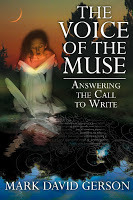 Whichever, you'll find 50 words and phrases to jump-start your writing on page 40 of The Voice of the Muse: Answering the Call to Write.
Whichever, you'll find 50 words and phrases to jump-start your writing on page 40 of The Voice of the Muse: Answering the Call to Write.
Please "like" these Facebook pages:• The Voice of the Muse book • The MoonQuest movie • The MoonQuest book • Mark David Gerson

"When I use a word," Humpty Dumpty said, in a rather scornful tone, "it means just what I choose it to mean — neither more nor less."
"The question is," said Alice, "whether you can make words mean so many different things."
"The question is," said Humpty Dumpty, "which is to be master -- that's all."
Alice was too puzzled to say anything; so after a minute, Humpty Dumpty began again.
"They've a temper, some of them -- particularly verbs: they're the proudest -- adjectives you can do anything with, but not verbs -- however, I can manage the whole lot of them! Impenetrability! That's what I say!"
"Would you tell me, please," said Alice, "what that means?"
"Now you talk like a reasonable child," said Humpty Dumpty, looking very much pleased. "I meant by 'impenetrability' that we've had enough of that subject and it would be just as well if you'd mention what you mean to do next, as I suppose you don't mean to stop here all the rest of your life."
"That's a great deal to make one word mean," Alice said in a thoughtful tone.
"When I make a word do a lot of work like that, said Humpty Dumpty, "I always pay it extra."
~ Lewis Carroll, Alice's Adventures in Wonderland and Through the Looking Glass

What's your relationship with words? Do you take charge of them, as Humpty Dumpty claims to have done? Or do you trust in their innate wisdom?
It wasn't so much over the words themselves that Humpty Dumpty claimed mastery. It was over rigid definitions. Are you a slave to those definitions? Or are you willing to free yourself to be as creatively playful as was Lewis Carroll?
 Whichever, you'll find 50 words and phrases to jump-start your writing on page 40 of The Voice of the Muse: Answering the Call to Write.
Whichever, you'll find 50 words and phrases to jump-start your writing on page 40 of The Voice of the Muse: Answering the Call to Write.Please "like" these Facebook pages:• The Voice of the Muse book • The MoonQuest movie • The MoonQuest book • Mark David Gerson
Published on October 26, 2011 10:55



